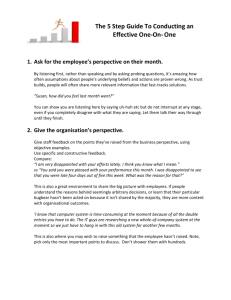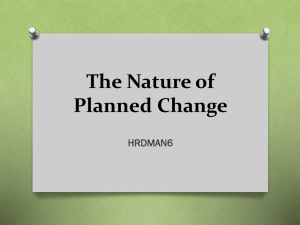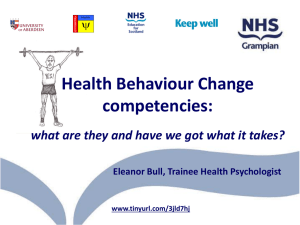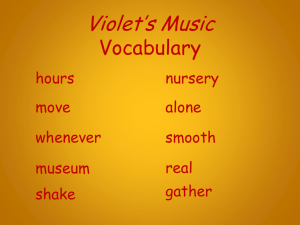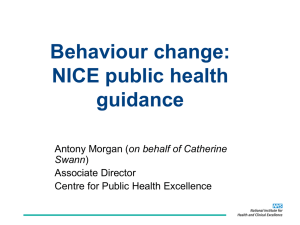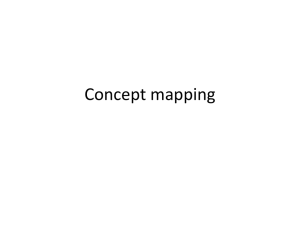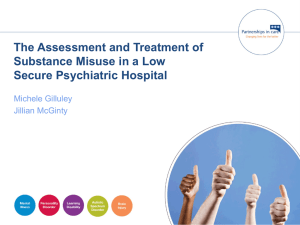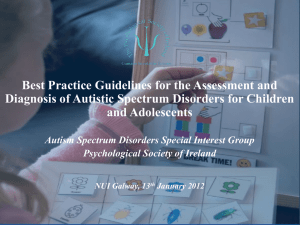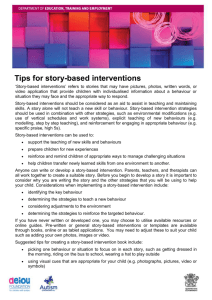Slides - Conference.ie
advertisement
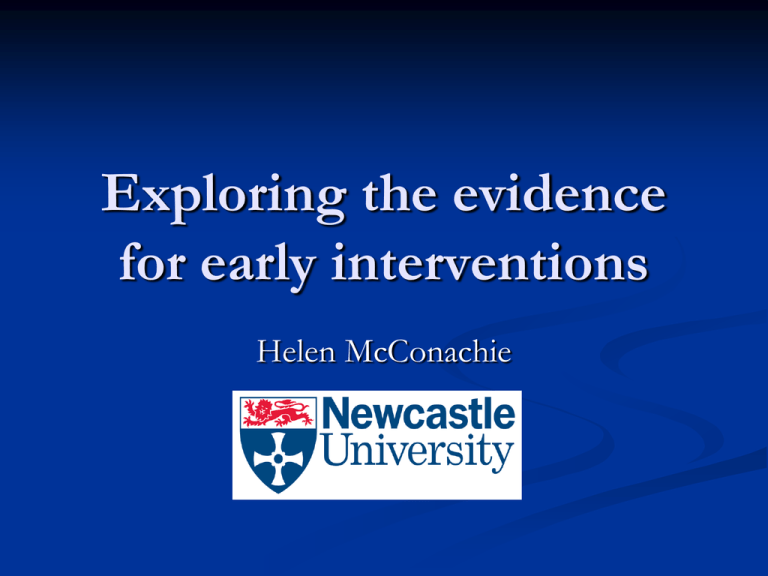
Exploring the evidence for early interventions Helen McConachie Interventions There is no ‘typical’ autistic child There is not a single specific cause for autism There cannot be a ‘best’ treatment for autism Therefore family needs Early diagnosis and information Family support Coordinated services Specific therapy/training Early interventions Main therapeutic goals Social and communication development Enhance learning and problem solving Reduce behaviour which interferes with gaining skills and achieving potential Management of habit patterns (eg. sleep, eating) Evaluation of interventions Challenges Children with ASD are heterogeneous group Outcome: need validated measures sensitive to change in core features Participants: numbers, representativeness Design: control, length of follow-up Research: evaluates single approach Age at diagnosis is reducing Median age 12 Current age 10 17 + yrs 13 to 16 9 to 12 5 to 8 up to 4 8 6 4 2 0 high functioning lower Early identification Early signs: eg limited social orienting, social initiation, limited gestures and other communication, repetitive motor behaviours But diagnosis before 30 months might be unstable Involvement of parents Early diagnosis Synchrony Noticing child cues and responding Mediator of child progress (Siller & Sigman 2002, 2008; Landa et al 2011; Aldred et al 2011) Parental stress Awareness that involvement may increase stress Stress predicts poorer child outcome (Strauss et al 2012) How effective is early intervention? We know: Some elements help children progress: structured teaching, visual cues, build communication skills, parent training,…. We don’t know Which approaches for which parents & children Evaluation of early intervention Comprehensive programme: 30 children - special nursery + parent training 29 children – special nursery (Rickards et al ’07 J Dev Behav Pediatr) Significant benefits of parent training: better cognitive development and behaviour in nursery more improvement for children in families with high stress Evaluated approaches to intervention Early intensive behavioural intervention Smith et al ’00, RCT compared with parent implementation: 4 year follow-up, best for children with ASD, IQ primary outcome. Magiati et al ’07 Compared with specialist nursery (>15 hours): 2 year follow-up, no difference in cognitive ability, play, language or autism severity Eldevik et al ’10 Meta-analysis of individual data (n=309) found change in IQ and adaptive behaviour – but great variability Evaluation of early intervention Early Start Denver Model 24 children – therapists 15 hrs/week, plus training parents (16 hrs/week reported) 24 children – usual services Children < 30 mos 2 year follow-up (Dawson et al ’10 Pediatr) Significant benefits: better language development and adaptive skills no data on parents Evaluated approaches to intervention These 3 examples involve a range of hours. NAP-C recommends 15 hours, with parents part of the intervention Parent training to increase communication Green et al ‘10 individual McConachie et al ’05 group to manage difficult behaviour Tonge et al ‘06 More Than Words Structure Parent group training, up to 8 families 20 hours group teaching (8-10 sessions), 3 months 3 home visits, video feedback on parent-child interaction led by speech & language therapists Content focus on interpersonal interaction follow child’s lead daily routines visual supports adapt environment From ‘More Than Words’, Sussman (1999) The Hanen Centre, Canada More Than Words OWL Observe, Wait, Listen ROCK Repeat what you say & do Offer opportunities Cue your child Keep it fun, keep it going Four I’s Include child’s interest Interpret, Imitate, Intrude Four S’s Say less and Stress Go Slow and Show Families and Communication Training and Support Evaluation of 14 ‘More Than Words’ courses 56 children aged 2 or 3 years, & their parents Immediate intervention & delayed controls 7 & 15 month follow up Interview responses Parents overwhelmingly positive reduced isolation course was inspiring at a time when parents felt particularly low (ie. around diagnosis) Course was well presented and practical home visits helpful for specific questions General learning as a couple, chance for fathers to talk learn about local services Model for measurement Parent adaptation to child; QRS-F stress parent feelings More Than Words interaction child skills child progress ADOS; BSQ; MCDI parent strategies Joy and Fun Assessment Group comparison at Time 2 Taking into account Time 1 scores, level of ability, diagnostic category and interval between assessments: Parent strategies (JAFA) Parent stress Parent adaptation to the child Child language (checklist of words MCDI) Child social communication Child behaviour problems = significant group difference Change in parent interaction strategies JAFA Similar findings: Carter et al 2011 RCT J Ch Psychol & Psychiat McConachie et al 2005 J Pediatrics Parent responsivity medium to large effect No effect on child communication Children with limited interest in objects benefited most How effective is early intervention? We know: Some elements help children progress: structured teaching, visual cues, communication skills,…. Parent involvement as part of comprehensive programme helps child and parent We need to explore further: Which approaches for which parents & children How to combine communication intervention & management of difficult/repetitive behaviours
